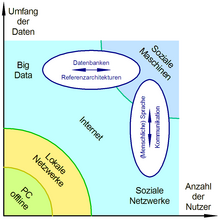Social machine

Social Machines (Engl. Social Machines ) are producing the result of a network of people and machines which information or actions that would be without one of the two is not possible. The term goes back to Tim Berners-Lee 's book "Weaving the Web":
“Real life is and must be full of all kinds of social constraint — the very processes from which society arises. Computers can help if we use them to create abstract social machines on the Web: processes in which people do the creative work and the machine does the administration. "
“Real life is and has to be limited by social factors - the same processes from which society arises. Computers can help, if we use them to create abstract social machines on the Internet: processes in which people participate creatively while the machine takes over the administration. "
use cases
By Human Computation (human-based information processing) problems can be solved, which has not by artificial intelligence would be to accomplish. Crowdsourcing refers to the procurement of problem-solving participants. Citizen Science uses social media , e.g. B. Data on environmental observations such as the occurrence of animals or plants. The social machines can be used as a design method for socio-technical systems in which the communicative added value of the participants is in the foreground. Hendler (2016) sees the role of AI systems, especially cognitive computer systems ( cognitive computing ), as an important factor, while Shadbolt et al. a. (2019) does not.
See also
literature
- Hendler, James; Mulvehill, Alice: Social Machines: The Coming Collision of Artificial Intelligence, Social Networking, and Humanity . Apress, 2016, ISBN 1-4842-1157-X .
- Shadbolt, Nigel; O'Hara, Keiron; De Roure, David; Hall, Wendy: Theory and Practice of Social Machines . Springer, 2019, ISBN 978-3-03010888-5 .
- Berners-Lee, Tim; Fischetti, Mark: Weaving the Web: The Original Design and the Ultimate Destiny of the World Wide Web by its inventor . Orion Business, 1999, ISBN 0-7528-2090-7 .
- Shadbolt, Nigel; O'Hara, Kieron: The Digital Ape: How to Live (in Peace) with Smart Machines . Scribe UK, 2019, ISBN 978-1-911617-81-5 .
Individual evidence
- ↑ p. 173, own translation